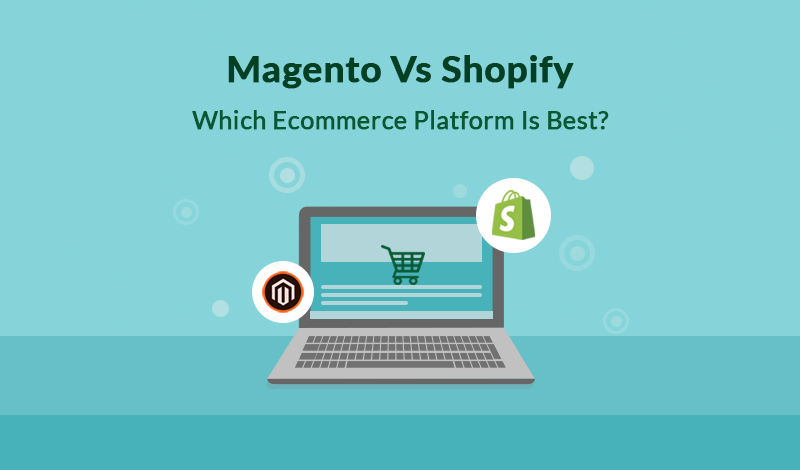When it comes to creating an ecommerce website, two platforms come to mind. They include Magento and Shopify. Considered the most popular platforms, it can be difficult to decide which platform to use.
Magento is free to install on your computer, just like WordPress. It is an open-source platform that anyone can use. But, if you require web hosting, you would need to pay around $10 a month.
Shopify is a popular online solution that lets you create an ecommerce store. One has to pay a fee every month to use its capabilities. Both small and large corporations widely use it.
This post compares Magento and Shopify so that you can choose best ecommerce platform.
1. Popularity
The first thing that we need to consider is popularity.
Magento was launched in 2004. Historically, it’s a popular framework for building ecommerce stores. However, ever since Shopify emerged, it has dominated ecommerce development. According to research, around 21 percent of all ecommerce stores are created using Shopify.
Despite the popularity of Shopify, Magento is considered the one-size-fits-all website builder. It still has a fair share of users, and its popularity has not waned. It can be said that Shopify is more popular with less experienced developers, while Magento is the Go-To framework for experienced developers.
2. Coding
The next thing that you need to look at when choosing an ecommerce platform is coding. If you are not a software company, you are unlikely to have coding skills. Magento and Shopify differ from each other significantly when it comes to coding.
Knowledge of PHP is required to use Magento, whereas Shopify uses Liquid. Magento is an open-source platform, while Shopify is not. It is crucial to consider the coding language to choose the right platform.
As Magento is open-source, the source code would be easily available and easy to modify. On the other hand, Shopify does not allow users to modify the code.
Magento users can alter the template code based on their needs. Thus, Shopify should only be considered when creating a simple store.
3. Cost
When selecting an ecommerce platform to design an online store, you have to look at the cost. Shopify requires users to pay a subscription fee monthly for accessing its software. It does provide a 90-day free trial that you can use to determine if it is the right fit for you or not.
Once the trial period ends, you have three options, as mentioned below.
- Basic Shopify: $29 Monthly
- Medium Shopify: $79 Monthly
- Advanced Shopify: $179 Monthly
You will need to buy the higher (premium) tier option to access more features such as advanced reporting, gift cards, and abandoned cart recovery.
Magento is free for everyone to use, unlike Shopify. It does have an Enterprise edition that will cost you according to your needs.
4. Hosting
Magento requires users to pay a third-party hosting as it is a self-hosted solution. On the other hand, Shopify offers hosting options. If you opt for Magento, you would need to pay around $4 for hosting services.
To run a successful online store, you cannot afford to overlook hosting as it influences website speed, the number of products the website can handle, and storage. Magento allows users to choose a hosting solution according to their needs, whereas Shopify only offers one option.
5. Add-Ons and Extensions
The cost of add-ons and extensions must also be taken into account when selecting between Magento and Shopify. The fact is that the basic software is never enough for creating an online store of your choice. The inadequacy of basic software means that you would need to spend some money on add-ons and extensions.
If Shopify users pay more each month, they get access to more features such as advanced reporting, gift cards, and abandoned cart recovery. But, Magento users can get similar features for much less.
6. Additional Expenses
When choosing between Magento and Shopify, you cannot afford to overlook additional expenses.
For instance, if you use Shopify, you would need to pay transaction fees on payments made using external payment gateways such as Authorize.net, Braintree, and PayPal. You would need to pay around 0.5 percent to 2 percent on each transaction.
The above shows just how expensive it can be to use Shopify. However, it is possible to avoid the deduction by using the direct payment gateway offered by Shopify.
Since Magento requires expert coding skills, you would need to hire a developer to set up the store. But, it all depends on whether you have coding experience or not.
7. Scalability
The main reason we create an ecommerce store is that we want it to grow, so you have to select a platform that offers scalability. When you take a close look at Shopify, you will realize that it is a simple tool, which makes it a great choice for creating a small store. However, you cannot count on it to help you create a bigger online store.
Magento offers a lot more scalability and flexibility, making it the best option for businesses that do not want to limit their possibilities. It is fully capable of coping with a high amount of traffic.
8. Capabilities
Before you choose an ecommerce platform, you must consider the capabilities of both platforms. Magento stands out when it comes to capabilities. It offers thousands of extensions that allow you to upgrade your website.
In comparison, Shopify does not offer as many extensions because of the open-source software used by Magento. If you can think of something, the chances are that Magento has an extension for it.
9. Themes
Finally, you have to look at the themes offered by Magento and Shopify. To create an online store, you will need a theme that you can utilize. Magento and Shopify both offer plenty of free and premium themes. Checkout Free Magento 2 Themes here.
Magento offers thousands of themes to users, whereas Shopify only has 65 templates at present, which is why Magento is the best platform if you are considering a variety of themes as the yardstick.
Conclusion – Which is Best Ecommerce Platform?
Although Shopify might be easy-to-use, it is not as diverse as Magento. If you want to create a simple store and do not have any plans for growing your business, Shopify might be the best platform for you. If scalability, variety, compatibility, and capabilities are your plan, then Magento is the way to go.
Arslan Hassan is an electrical engineer with a passion for writing, designing, and anything tech-related. His educational background in the technical field has given him the edge to write on many topics. He occasionally writes blog articles for Dynamologic Solutions.




Leave a Reply